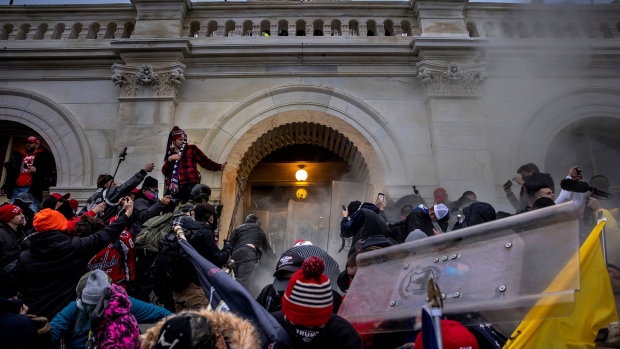May 28, 2021
Senate Republicans Block Bipartisan Probe of Jan. 6 Capitol Riot
, Bloomberg News

(Bloomberg) -- Senate Republicans blocked a bill to create a bipartisan commission to investigate the Jan. 6 insurrection at the U.S. Capitol, avoiding a high-profile public review of the siege by supporters of Donald Trump as the 2022 midterm elections draw closer.
The 54-35 vote Friday fell shy of the 60 needed to start debate on the measure, with Senate GOP Leader Mitch McConnell and Trump rallying Republicans to oppose the probe.
The vote came after Senate Majority Leader Chuck Schumer agreed to delay passage of a bipartisan bill to bolster U.S. economic competitiveness and confront China’s rise as a group of Republican lawmakers demanded more time to consider the legislation.
McConnell has accused Democrats of wanting the commission as a political weapon, while Schumer accused Republicans of seeking a political shield by blocking an independent probe.
“If our Republican friends vote against this, what are you afraid of? The truth?” Schumer said Friday on the Senate floor. “Are you afraid Donald Trump’s big lie will be dispelled? Are you afraid that all the misinformation that has poured out will be rebutted by a bipartisan, down-the-middle commission?”
The failure to advance the bill on the commission came despite Senator Susan Collins of Maine -- one of seven Republicans to vote to convict Trump during his second impeachment trial -- proposing small changes to the House-passed bill in an attempt to address some GOP objections.
The House measure, which envisioned a panel modeled on the bipartisan commission that investigated the Sept. 11 terrorist attacks, allowed Republican and Democratic leaders to name five members each, with subpoenas requiring both parties’ support. Collins proposed requiring bipartisan staffing authority and ending the commission’s operations 30 days after a Dec. 31 deadline for delivering a final report.
Most Republicans, however, wanted to prevent the commission from being formed.
McConnell and other GOP lawmakers have expressly raised concerns that Democrats would be able to use the inquiry to politically damage Republicans in next year’s House and Senate campaigns. He said Thursday he doubted that a commission would generate new facts or promote healing.
“The role of the former president has already been litigated exhaustively, exhaustively in the high-profile impeachment trial we had right here in the Senate several months ago,” McConnell said this week. He also cited multiple Senate committees investigating security failures and the continuing Justice Department investigation that has resulted in hundreds of people charged with crimes.
Gladys Sicknick, the mother of Capitol Police Officer Brian Sicknick, who was injured during the riot and died of a stroke a day later, went to Capitol Hill Thursday with her late son’s partner. They met with senators to press them to support the commission.
“I just couldn’t stay quiet any more,” Sicknick said after leaving the office of Senator Mitt Romney, a Utah Republican, who supported creating a Jan. 6 commission.
The idea for such a panel also has been praised by people who served on the Sept. 11 commission.
“I hope people will look beyond the election cycle,” former Democratic Representative Tim Roemer of Indiana, a member of that panel, told reporters on a conference call. “We need to show the world that Jan. 6 was an aberration. It was an assault on our democracy” and that “we are not going to let it happen again.”
Senator Joe Manchin, a West Virginia Democrat, said “fear took over” Republicans who opposed the commission at a time when Trump remains popular with so many of their constituents.
“I’m very disappointed and frustrated that politics has trumped, literally and figuratively, the good of the country.”
Manchin, however, has said that Republicans blocking of the bill would not cause him to reconsider his opposition to getting rid of the filibuster, which allows the minority party to block most legislation by requiring 60 votes to allow debate to go forward. This marked the first uses of that procedure since President Joe Biden took office.
Rejecting the bipartisan commission, however, doesn’t end the issue. House Majority Whip Jim Clyburn said Thursday on CNN he would urge Speaker Nancy Pelosi to either empower House committees to investigate or set up a select House committee, which Democrats would control.
Republicans did that years ago in the aftermath of the 2012 attack on a U.S. compound in the Libyan city of Benghazi. Representative Kevin McCarthy, now the House GOP leader, at the time credited the Benghazi panel with harming Hillary Clinton’s candidacy as she sought the 2016 Democratic presidential nomination.
McConnell has walked a tightrope over the insurrection, which disrupted congressional certification of Biden’s victory in the Electoral College. Early on, he accused Trump of provoking the attack on the Capitol and failing to quickly put an end to it. He delayed Trump’s impeachment trial until after he left office and then voted to acquit him on the argument impeachment trials of former officials are unconstitutional.
Since then, he has largely sought to avoid the subject, unlike Representative Liz Cheney of Wyoming, a backer of the commission who has continued to condemn Trump’s false claims that fraud cost him the 2020 election. She warns that allowing his narrative to go unchallenged could lead to more violence. Her position cost her her leadership position in the House.
McConnell’s preferred topic is Biden’s spending plans, which he assailed this week as “mediocre socialism.”
Senator Lisa Murkowski of Alaska, one of the Republican supporters of the commission, said the country needs a credible investigation of what happened and said the bipartisan, independent route was the way to go.
“I think what we all want is closure,” she said.
©2021 Bloomberg L.P.







